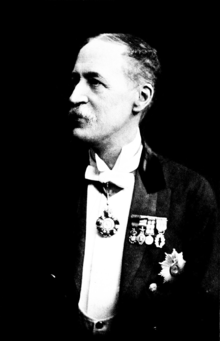
Sir Herbert Hope Risley KCIE CSI FRAI (4 January 1851 – 30 September 1911) was a British ethnographer and colonial administrator, a member of the Indian Civil Service who conducted extensive studies on the tribes and castes of the Bengal Presidency. He is notable for the formal identification of the centuries old established caste system of the entire Hindu population of British India in the 1901 census, of which he was in charge. As an exponent of scientific racism, he used anthropometric data to divide Indians into seven races.[1][2]
Risley was born in Buckinghamshire, England, in 1851 and attended New College, Oxford University prior to joining the Indian Civil Service (ICS). He was initially posted to Bengal, where his professional duties engaged him in statistical and ethnographic research, and he soon developed an interest in anthropology. His decision to indulge these interests curtailed his initial rapid advancement through the ranks of the Service, although he was later appointed Census Commissioner and, shortly before his death in 1911, became Permanent Secretary at the India Office in London. In the intervening years he compiled various studies of Indian communities based on ideas that are now considered to constitute scientific racism. He emphasised the value of fieldwork and anthropometric studies, in contrast to the reliance on old texts and folklore that had historically been the methodology of Indologists and which was still a significant approach in his lifetime.
Aside from being honoured by his country, including by the award of a knighthood, Risley also became President of the Royal Anthropological Institute.
- ^ Trautmann (1997), p. 203.
- ^ Walsh (2011), p. 171.